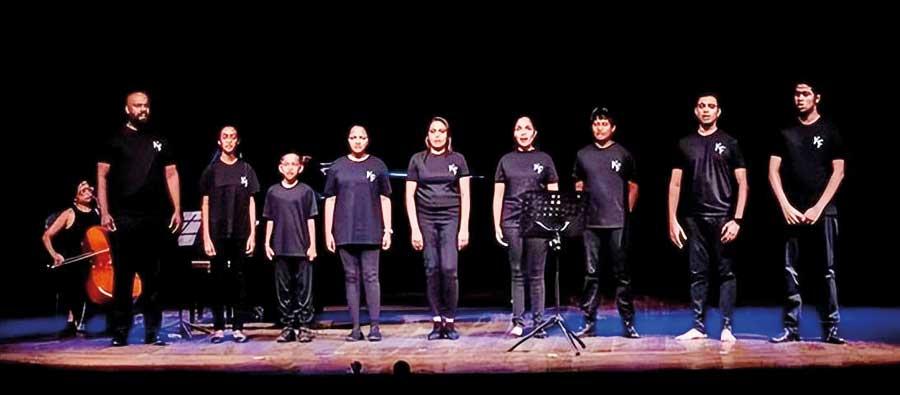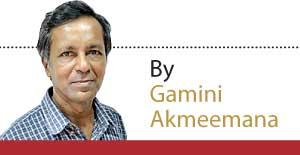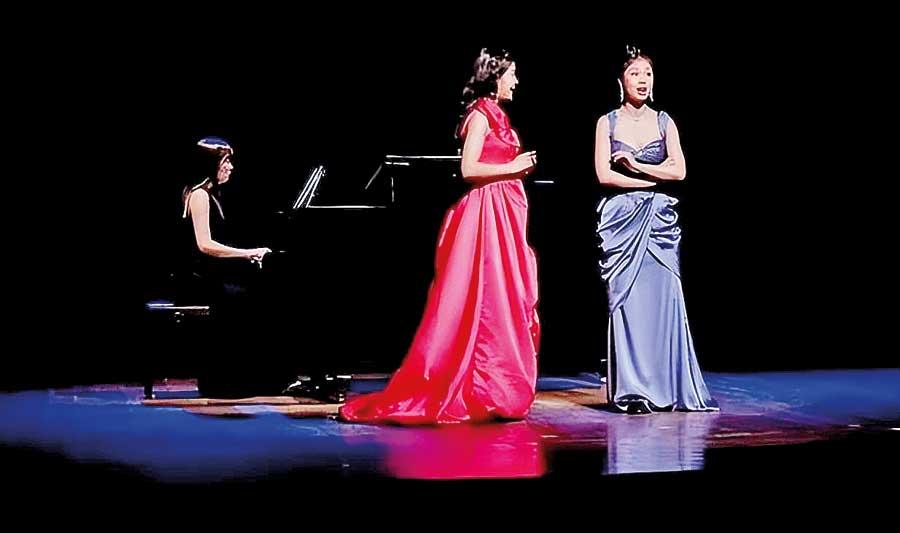05 Feb 2024 - {{hitsCtrl.values.hits}}

Singers from Khemadasa Foundation
The staging of an imaginative selection of opera last week at the Lionel Wendt was laudable for a number of reasons. In a country familiar with political soap opera pinning down a population struggling to free itself from encrusted layers of corruption and political blackmail, an enchanting display of the durability of art over political cynicism was a cathartic experience for those who had the wits to separate oil from water.
population struggling to free itself from encrusted layers of corruption and political blackmail, an enchanting display of the durability of art over political cynicism was a cathartic experience for those who had the wits to separate oil from water.
That this repertoire, 99 per cent Western except for one item, performed by a group of Chinese singers too, was an eye opener. Globalisation is said to be on its way out. Here I recall the words of a visiting Indian classical guitarist who said that Western Music is no longer a Western monopoly, and these Chinese opera singers went a long way to prove it.
To drive the point home, the programme included a piece by Russian composer, Sergei Rachmaninov; anyone Russian cannot perform and anything Russian cannot be performed in the West nowadays as censors have banned anything artistic even remotely Russian, after Putin’s invasion of Ukraine. Russian artists cannot perform in Western Europe any more. But, thanks to Globalisation, we can listen to an operatic piece by Rachmaninov sung by a Chinese.
So art is politics, after all. This Bel Canto opera was here thanks to China’s ongoing Belt and Road Initiative. This is where we need to separate oil from water, while we still can. In totalitarian states, art has always been a tool of the rulers, and those artists who didn’t toe the line were censored or worse.
But opera is opera. Let’s recall here that during its early stages in Italy, opera did not permit women on stage, and young boys were castrated so they could sing the female parts properly. But this doesn’t detract anyone from enjoying Verdi, Rossini or Puccini today. China has its own eunuch tradition, and it’d be interesting to find out if Peking opera allowed women singers centuries ago or if eunuchs filled the part.
This is a country in crisis. The arts, ranging from books, the plastic arts, music and movies have suffered huge setbacks. Only the most inept and mediocre of comedies are staged, and the only film to have a decent run over the past three years is a lacklustre comedy. In any case, opera has always been remote, exotic and alien, having a niche presence only in Colombo. The cohorts of Lankans living in Italy don’t seem to have infused our culture with a love of opera judging from the way one of our best opera singers was jeered at the Galle Face Green for performing ‘Danno Budunge’ in a new style.
It wasn’t Colombo’s pretty insular and self-satisfied Lionel Wendt crowd that filled the auditorium that evening, however. Attendance was by invitation, and thanks to the foresighted way in which invitations were handed out, there was a large number of non-English speaking art and music lovers, writers, intellectuals etc. This is as it should be since, all over the world, millions of people who watch opera understand neither English nor Italian, nor German, French, Russian or Chinese. The programme included all these languages (and Sinhala too, courtesy of the Khemadasa Foundation and its singers led by Gayathri Khemadasa).

A scene from the operatic performance
In Sri Lanka, the arts have suffered huge setbacks. Only the most inept and mediocre of comedies are staged. Opera has always had only a niche presence in Colombo. The cohorts of Lankans living in Italy don’t seem to have infused our culture with a love of opera, judging from the way one of our best opera singers was jeered at the Galle Face Green for performing ‘Danno Budunge’ in a new style (on soprano pitch)
But I think it’s a pity that at least a singer or two from the small number of opera singers from Sri Lanka were not included. There are at least a few who can interpret Verdi or Mozart or Donazetti as well as the Bel Canto singers. They performed with the Sri Lanka symphony orchestra till the pandemic began. As it is, the visiting Chinese left the country without any idea of our operatic talent except what the Khemadasa Foundation offered.
As for Bel Canto, it went very well that evening. As Peter Ustinov once said, opera performers need both acting and singing talent, and they rarely go together. When they are good singers, they are terrible actors, and when they are good actors, they are terrible singers. But these young Chinese performers managed both feats, conjuring up opera’s dark moods (as in Macbeth) and its abundant good humour, comedy and high spirits.
The group was led by Prof. Yan Min Tao, baritone singer and an associate professor of the conservatory of music at Nanjing Normal University. After singing Pietta Rispetto Onore from Verdi’s Macbeth, he concluded with a song, Qian xing (Holding Stars) from the Chinese opera “Zheng He.”
I have no knowledge of Chinese opera, modern or traditional, simply because I have not been exposed to it. I once found an EP vinyl record of a Mao era revolutionary opera featuring his Red Guards, but it was too badly damaged to be of any use. Listening to Prof. Yan Min Tao singing in Italian and Chinese, however, I was struck by just how alike the songs sounded – Verdi certainly darker in mood as fitting for this tale of violence, and the starry eyed quality of the romantic Chinese opera piece. Opera is truly a universal language.
All except a few of these Bel Canto singers are quite young. The audience didn’t notice time pass by as they interpreted a varied and very interesting programme which included a lot of Donizetti, some Mozart and Verdi but also Franz Lehar (The Merry Widow Waltz), Vivaldi, Bizet, Handel, Rachmaninov, Scarlatti and Giuseppe Giordani. It was truly international, and local colour was provided by the sombre toned Khemadasa Foundation singers with their Manasavila Opera written by Dr. Sunil Wijesiriwardhane and composed by Dr. Premasiri Khemadasa.
The concluding song was ‘Auld Lang Syne’ sung by the entire ensemble. It’s a Scottish song set to the words of Scottish poet, Robert Burns. But, as Prof. Yan Min Tao urged the audience to sing along, only a murmur could be heard. It isn’t necessary to know a Scottish song by heart to be judged as cultured, but if people know it then it shows a broader grasp of international culture and arts. Unfortunately, that didn’t seem to be the case. Nor should it be seen a sop to neo-colonialism, as neither the Chinese or us were ever colonised by the Scots.

Opera singers from China
04 Jan 2025 3 hours ago
04 Jan 2025 3 hours ago
04 Jan 2025 4 hours ago
04 Jan 2025 4 hours ago
04 Jan 2025 5 hours ago